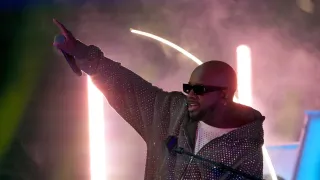
6 hours ago
SZA Speaks Out on Drake–Kendrick Lamar Feud
READ TIME: 2 MIN.
The longstanding tension between Canadian rapper Drake and American rapper Kendrick Lamar erupted into one of hip-hop’s most scrutinized feuds in 2024. While their rivalry dates back to competitive verses in the early 2010s, it escalated dramatically following Kendrick Lamar’s pointed lines in “Like That” and a series of increasingly personal diss tracks from both artists throughout spring 2024. These included Lamar’s “Euphoria” and “Not Like Us,” as well as Drake’s “Push Ups,” “Taylor Made Freestyle,” and “Family Matters”.
The feud’s intensity reached a peak in May 2024, with both rappers levying serious allegations against one another in their music. The public response was divided, with some commentators praising the lyrical spectacle and others expressing concern about the personal nature of the accusations and their broader cultural implications.
SZA, who has collaborated with both Drake and Kendrick Lamar, addressed the public about her approach to the feud in a recent interview. She noted that while the situation was “uncomfortable,” her priority was to remain grounded and respectful toward both artists. SZA explained, “I love both of them as people and artists, and I’m not choosing sides. My focus is on my own growth and making sure I support my friends however I can, without getting caught in the crossfire”.
Her remarks underscore the challenges faced by women artists who are often positioned between powerful male figures in the industry. SZA’s commitment to authenticity and self-care resonates with many fans, including those from LGBTQ+ communities, who frequently navigate similar pressures to take sides or conform to rigid group loyalties
The feud has reignited conversations about the state of hip-hop culture, especially concerning the treatment of women and marginalized artists. The genre has a history of both celebrating and challenging gender and sexual norms, and the public responses to the Drake–Kendrick Lamar conflict have reflected these tensions. Many LGBTQ+ commentators have pointed out the need for more inclusive and affirming spaces within hip-hop, where artists of all identities can thrive without being drawn into destructive rivalries.
SZA’s approach—refusing to take sides and focusing on community—serves as a model for how artists can resist divisive pressures and instead foster environments that celebrate creative diversity. This stance is especially relevant as more openly LGBTQ+ artists continue to break through in hip-hop, challenging the genre’s traditional boundaries and demanding respect and visibility.
As the dust settles from this high-profile feud, SZA’s perspective highlights the importance of maintaining supportive networks in the face of public conflict. Her refusal to be drawn into the controversy, combined with her focus on personal well-being and mutual respect, offers a template for navigating the complexities of fame, friendship, and professional loyalty.
For the broader hip-hop community, the episode serves as a reminder that the most lasting cultural progress comes from uplifting all voices—especially those of women, transgender people, and other LGBTQ+ communities whose contributions have too often been marginalized.






